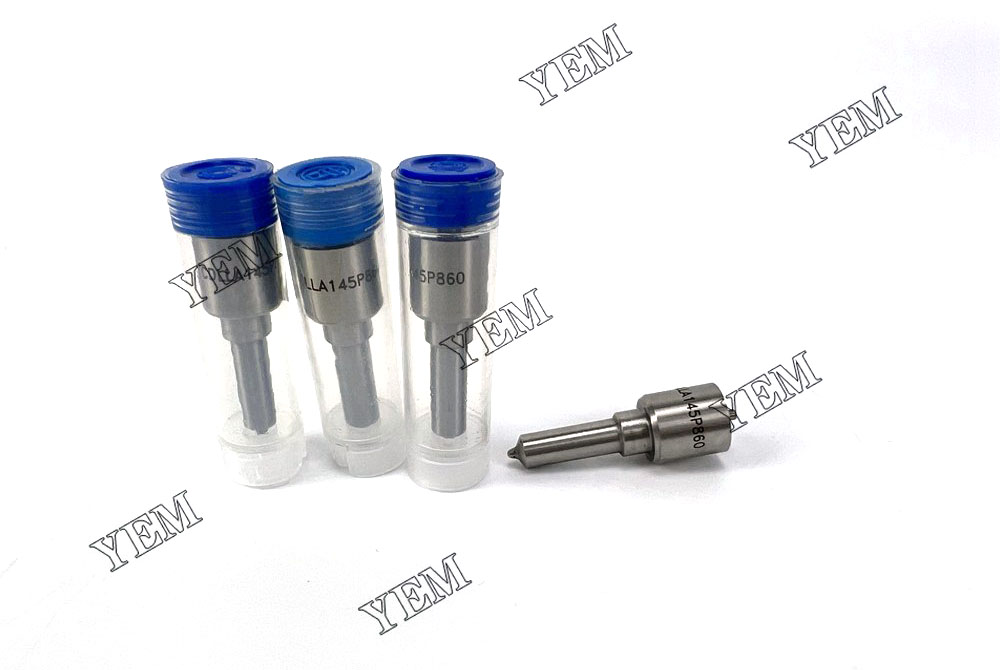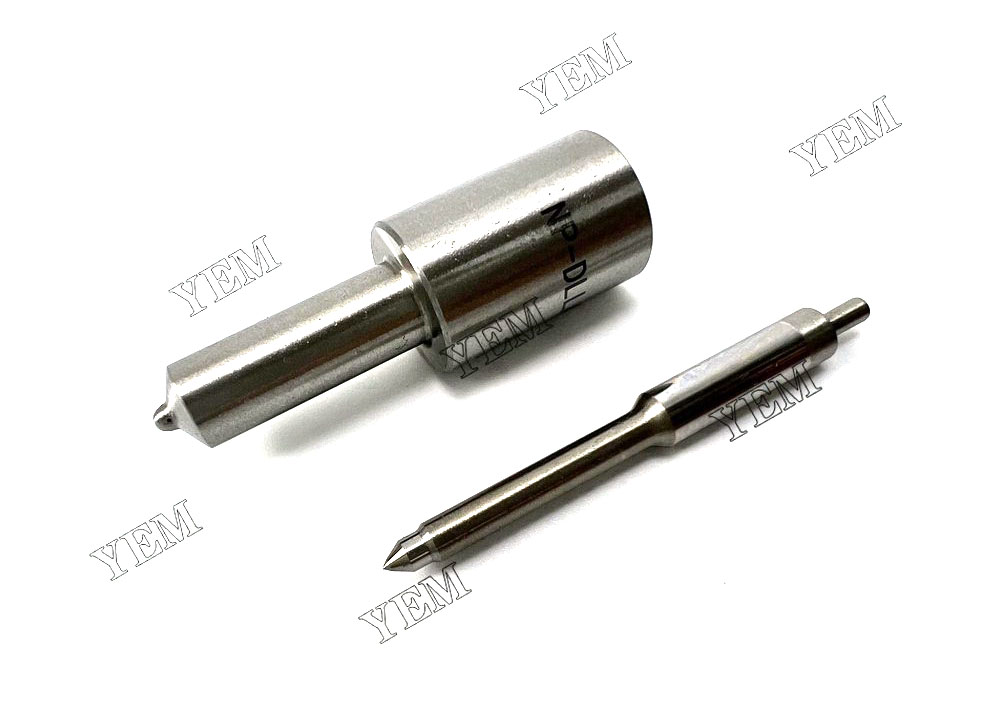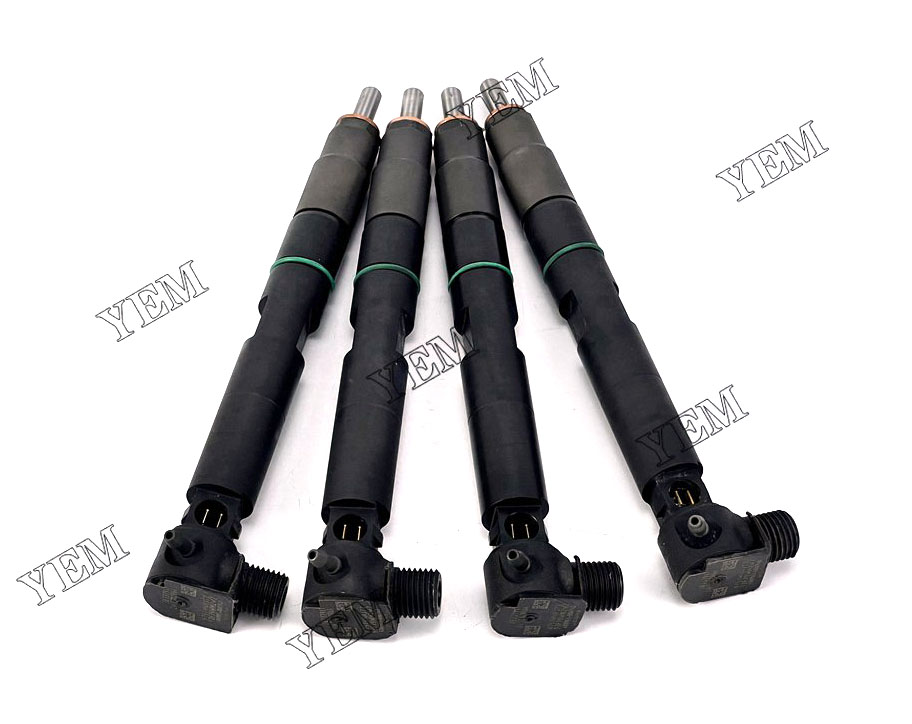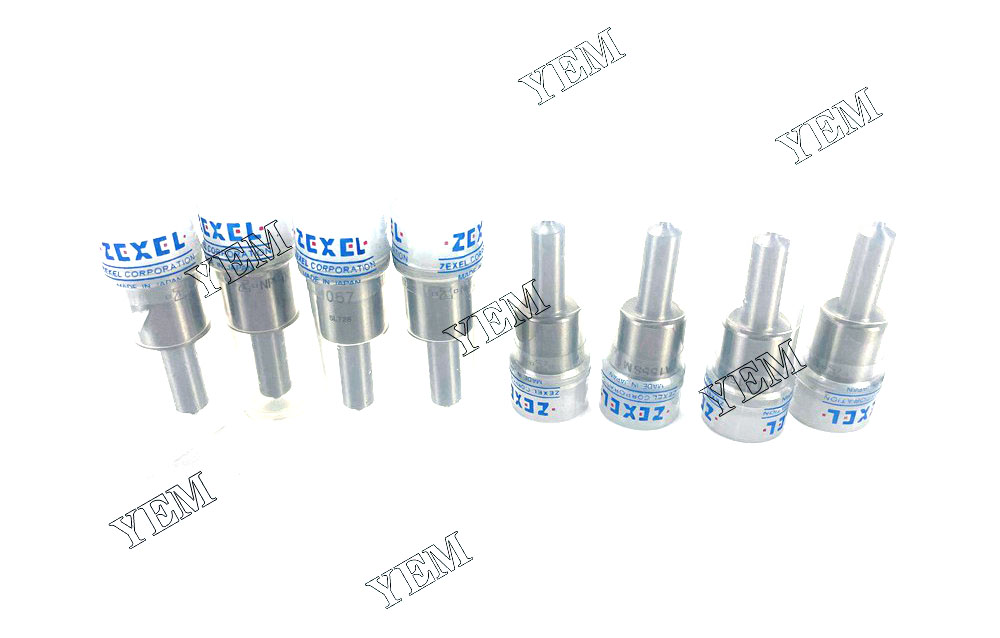Basic principles and functions of engine fuel injectors
Engine fuel injector (Fuel Injector) is an important part in modern internal combustion engines. Its basic principle and function is to inject fuel into the combustion chamber of the engine at precise time, dosage and manner, so as to realize the mixing and combustion of fuel and air. The following is a brief description of the fundamentals and function of an engine injector:
Fundamental:
- Control fuel injection: The engine fuel injector realizes precise control of fuel by controlling the injection time and quantity of fuel. This is usually accomplished with a solenoid valve and orifice configuration.
- High-pressure injection: The engine fuel injector usually works under high pressure to ensure that the fuel is instantly formed into fine mist particles and quickly mixed into the air in the cylinder.
- Match combustion demand: According to different working conditions and load requirements, the engine control system can adjust the injection time and injection quantity of the fuel injector to match the combustion demand and achieve efficient combustion and power output.
Basic skills:
- Fuel injection: The engine injector injects fuel into the combustion chamber of the engine by means of high-pressure injection. Injected fuel is distributed in the air in the form of fine mist particles for thorough mixing and combustion.
- Uniform distribution of fuel: The fuel injector can realize precise control of fuel and ensure uniform distribution of fuel in each cylinder to improve engine stability and work efficiency.
- Fuel injection time control: The engine control system realizes the control of fuel injection time by accurately controlling the opening and closing time of the fuel injector to ensure the accuracy and stability of fuel injection.
- Emission control: By precisely controlling the amount and form of fuel injection, engine fuel injectors can affect the oxygen content and product content of exhaust emissions to a certain extent, helping to reduce pollutant emissions.
In a word, the engine fuel injector plays a vital role in the internal combustion engine. Through precise control of fuel injection, complete mixing of fuel and air and efficient combustion can be achieved, power output can be provided and emissions can be controlled.

Different types of fuel injectors
The type of engine injectors varies with different fuel supply systems and engine designs. Here are a few common types of injectors:
- Conventional multi-hole injector (Multi-Hole Injector): This type of injector has multiple small holes through which fuel is sprayed into the combustion chamber in atomized form. Conventional multi-hole fuel injectors can provide uniform fuel distribution and better combustion effects, and are widely used in gasoline and diesel engines.
- Direct injection injector (Direct Injection Injector): Direct injection injector is an advanced fuel injection technology, fuel is directly injected into the combustion chamber through the injector instead of premixed fuel and air. This design can provide higher combustion efficiency, power output and fuel economy.
- PFI fuel injector (Port Fuel Injection Injector): The PFI fuel injector is placed in the intake port, injecting fuel to the side wall of the cylinder or the intake port, and the fuel enters the combustion chamber along with the intake airflow. This type of nozzle was often used in the multi-point fuel injection system of early automobiles to facilitate the mixing of fuel and air.
- GDI fuel injector (Gasoline Direct Injection Injector): GDI fuel injector is a high-pressure injection system that injects fuel directly into the combustion chamber instead of entering the intake port. The injectors provide improved fuel economy, power delivery and emissions control.
- CRDI injector (Common Rail Direct Injection Injector): CRDI injector is a high-pressure fuel injection system for diesel engines, which provides constant high-pressure fuel through the common rail fuel supply system, and injects fuel at high pressure through the injector to the combustion chamber. This type of injector provides more precise control of the fuel injection and combustion process to improve fuel efficiency and power output.
Note that different types of engines and fuel supply systems may use different injector technologies, and that injectors of the same type may vary in different engine models and applications. Therefore, the specific injector type and design will depend on the specific vehicle or engine requirements and configuration.
Working principle of fuel injector and fuel injection time control
The working principle of the fuel injector (Fuel Injector) is to inject fuel into the combustion chamber of the engine at a precise time, dosage and method to achieve the mixing and combustion of fuel and air. The working principle of the fuel injector mainly involves the following two aspects: fuel injection mechanism and fuel injection time control.
- Fuel injection mechanism:
There is a solenoid valve inside the fuel injector, and the opening and closing of the valve is controlled by the engine control unit (ECU) through electronic signals. When the solenoid valve is opened, high-pressure fuel is supplied by the fuel system and injected out through the nozzle hole of the fuel injector. The number and shape of the nozzle holes determine the injection method and atomization effect, ensuring that the fuel is sprayed into the combustion chamber in the form of fine droplets. - Fuel injection timing control:
Controlling the fuel injection timing is the key to ensure accurate and effective fuel injection. The fuel injection timing is accurately calculated and adjusted by the engine control unit (ECU) based on information from various sensors and control algorithms. The ECU determines the best fuel injection time by monitoring the engine’s running state, load, speed, feedback from the oxygen sensor, etc. The fuel injection timing control can be divided into two stages: opening time and closing time.
- Opening time: ECU calculates the appropriate fuel injection start time according to the engine control strategy and requirements, that is, the time point when the solenoid valve is opened. At this time, high-pressure fuel is injected into the combustion chamber through the nozzle hole of the fuel injector.
- Closing time: ECU calculates and adjusts the time point of the end of fuel injection according to the fuel injection quantity, that is, the time when the solenoid valve is closed. After the solenoid valve is closed, the fuel injector stops injecting fuel to ensure precise control of fuel dosage.

By precisely adjusting the fuel injection time, the ECU can ensure that the fuel injection quantity and injection method match the working state of the engine, so as to improve combustion efficiency, power output and fuel economy.
It should be noted that the control accuracy of fuel injection time and the adjustment degree of fuel injection quantity will vary due to different engine types, fuel supply systems and control algorithms. Engine manufacturers and automakers optimize and calibrate fuel injection timing during design and commissioning to ensure engine performance and emissions meet standards.
Failures and common problems of fuel injectors (such as clogging, uneven fuel injection, etc.)
The fuel injector (Fuel Injector) may encounter some failures and common problems during long-term use. Here are some examples of frequently asked questions:
- Blockage: The injector nozzle may be blocked by deposits, carbon deposits or impurities. This may lead to poor fuel injection or complete blockage of the injection holes, affecting fuel injection and combustion effects.
- Uneven fuel injection volume: If the injection holes in the fuel injector are uneven or blocked, it may cause uneven fuel injection volume, which will affect the engine’s smoothness, combustion efficiency and power output.
- Fuel leakage: There may be a sealing problem in the fuel injection nozzle, resulting in fuel leakage. This can lead to wasted fuel, incomplete combustion and emissions issues.
- Fuel injection time deviation: If the control signal of the fuel injector is inaccurate or the solenoid valve fails, it may cause a deviation of the fuel injection time, and the fuel injection time cannot be accurately controlled, which will affect the fuel injection and combustion process.
- Pressure problem: A certain fuel pressure is required when the fuel injector works. If the fuel pressure in the fuel system is unstable or insufficient, it may cause the injection effect of the fuel injector to be poor.
Maintaining and cleaning injectors can reduce the occurrence of these common problems. Regularly use a special fuel injector cleaner to clean the fuel injectors to remove deposits and carbon deposits. In addition, regular inspection and maintenance of the fuel supply system, including fuel filter replacement, fuel pump inspection and maintenance, etc., can also help reduce the occurrence of fuel injector problems.
In the event of injector malfunctions and common problems, it is recommended to consult a professional auto mechanic for diagnosis and repair to ensure that the problem is properly resolved. They can repair the fault by checking the working status of the fuel injector, cleaning or replacing the nozzle, and adjusting the fuel injection time.
Maintenance and cleaning methods of fuel injectors
Maintaining and cleaning the fuel injector (Fuel Injector) is an important step to ensure its normal operation and prolong its life. Here are some common injector maintenance and cleaning methods:
- Use fuel injector cleaning agent: regular use of special fuel injector cleaning agent can remove carbon deposits and deposits inside the fuel injector. Choose an appropriate cleaning agent and use it according to the manufacturer’s instructions. Usually, this involves using a fuel injector washer or connecting a cleaning agent to the fuel system for circulation.
- Clean the nozzle filter: Some fuel injector designs may have a nozzle filter, which is used to prevent impurities from entering the fuel injector. Clean or replace nozzle filters regularly to ensure unimpeded fuel flow. Consult the relevant vehicle service manual for specific steps on how to replace the filter.
- Check the fuel system pressure: regularly check the working pressure of the fuel system to ensure that the pressure is within the specified range. Too low or too high fuel pressure may affect the normal operation of the fuel injectors. If abnormalities are found, please repair or correct the fuel system pressure in time.
- Regular maintenance of the fuel system: regular replacement of the fuel filter and air filter can prevent impurities from entering the fuel injector and fuel system and keep them in normal operation. At the same time, it is recommended to check and clean the fuel supply line regularly to ensure that there is no blockage or leakage.
- Driving habits: Good driving habits can also have a positive impact on the life of the injectors. Avoiding frequent sudden acceleration and sudden braking, maintaining proper shift points and a stable driving speed can reduce the load on the fuel injector and prolong its service life.
Please note that it is recommended to follow the relevant vehicle manufacturer’s guidelines and technical instructions when performing maintenance and cleaning of injectors. If you are unsure about performing these steps, it is recommended to consult a professional automotive mechanic or visit an authorized repair center for maintenance and cleaning operations.

How to choose the right fuel injector for your specific engine
Selecting a fuel injector for a specific engine requires consideration of several factors, including engine type, fuel delivery system, performance needs and application environment. Here are some guidelines:
- Engine type: Different types of engines (such as gasoline engines, diesel engines, direct injection engines) usually require different types of injectors to meet their fuel injection needs. According to the fuel system and design requirements of the engine, select the corresponding type of fuel injector.
- Fuel supply system: Different fuel supply systems may have different requirements, for example, conventional multi-hole fuel injectors are suitable for traditional multi-point fuel injection systems, while direct injection fuel injectors are suitable for direct injection fuel systems. Know your engine’s fuel supply system type to select compatible injectors.
- Horsepower and performance requirements: According to the performance requirements of the vehicle or engine, select the appropriate injector. Larger injectors generally provide greater fuel flow and are suitable for high performance engines. But care needs to be taken to ensure that the engine and fuel system can accommodate the injector flow.
- Application environment: Some special application environments (such as high altitude areas and extreme temperature environments) may require specially designed injectors to adapt to different climates and environmental conditions. When selecting fuel injectors, consider the impact of the vehicle’s operating environment on the performance of the fuel injectors.
- OEM Recommendations: Refer to the vehicle manufacturer’s recommendations and specification recommendations. Manufacturers usually provide engine-specific recommendations, including suitable injector types, specifications and parameters. These recommendations can be used as a reference for selecting fuel injectors.
The best way to do this is to consult a professional automotive engineer or seek advice from the manufacturer responsible for supplying the injectors. They can provide you with the right injector options for your specific engine and application needs and help you make the right choice.
Effect of fuel injectors on engine performance and fuel economy
Fuel Injector has an important impact on engine performance and fuel economy. Here’s how they specifically affect engine performance and fuel economy:
- Engine performance:
- The way fuel enters the combustion chamber and how efficiently the injectors work affects the quality of the fuel-air mixture. A good fuel injector can inject fuel into the combustion chamber in the form of fine liquid droplets, which promotes sufficient mixing with air, thereby improving combustion efficiency.
- The fuel injector can accurately control the fuel injection quantity and fuel injection time according to the engine working status and load demand. This helps ensure proper fuel delivery, improves power delivery and acceleration response, and improves engine smoothness and driving experience.
- Fuel economy:
- The design and operation of the fuel injector affects the efficiency of fuel injection and combustion. High-efficiency fuel injectors can ensure full combustion of fuel, reduce fuel waste and improve fuel utilization, thereby reducing fuel consumption and emissions.
- Precise fuel injection quantity and fuel injection timing control can adjust fuel supply according to demand to achieve the best combustion effect and fuel economy. This helps to optimize fuel consumption and reduce emissions.
Overall, good injectors can improve engine performance, including power delivery, acceleration response and ride smoothness. At the same time, they also have a positive impact on fuel economy, helping to reduce fuel consumption and reduce environmental pollution. Therefore, when choosing a fuel injector, consider the balance of performance and economy, and choose a fuel injector that is suitable for the specific engine and vehicle needs.

Technical progress and future development trends of fuel injectors
As a key component of the fuel injection system, the fuel injector is undergoing continuous technological progress and innovation with the continuous development of automobile technology and fuel economy. The following are some aspects of the technological progress and future development trends of fuel injectors:
- Direct injection technology: Direct injection technology allows fuel to be directly injected into the combustion chamber to improve fuel combustion efficiency and power output. This technology can achieve higher fuel pressure and precise fuel injection control to suit different driving conditions and needs.
- More precise fuel injection control: Future fuel injectors will more precisely control fuel injection volume and fuel injection time to cope with different load and speed conditions. These technological developments include faster response times, more precise variable control of fuel injection and flexible multi-point injection, among others.
- Fuel atomization technology: The effect of fuel atomization has an important impact on combustion efficiency and power output. Factors such as the design of the fuel injector and the shape of the nozzle hole will be further optimized to achieve finer and more uniform fuel atomization, thereby improving combustion efficiency and power output.
- Development of electronic fuel injection system: The electronic fuel injection system will continue to develop, and provide higher flexibility and responsiveness by controlling the work of the fuel injector through precise electronic control. This will include smarter injector control algorithms, more sophisticated sensor technology and greater integration.
- Diversification of fuels: The automotive industry is increasingly demanding more sustainable and environmentally friendly fuels. The development of future fuel injectors will also consider adapting to various fuel types, including hybrid fuels, biofuels and hydrogen fuels.
In general, the development trend of fuel injectors in the future will focus on higher precision, higher efficiency and more fuel adaptability. This will help to further improve engine performance and fuel economy while meeting the automotive industry’s demand for environmentally friendly solutions.
Contact us
Thank you for your interest in YEM Excavator Parts Team! We are a professional excavator accessories team, committed to providing customers with high-quality and reliable excavator accessories solutions.
Our team has years of industry experience and the technical knowledge to accurately identify and resolve various excavator parts issues. Whether you need to replace a damaged part, upgrade an existing accessory or find a specific accessory, we are able to provide you with professional advice and assistance.
As a responsible supplier of excavator parts, we cooperate with many well-known manufacturers to ensure that the provided parts are of excellent quality and reliable performance. Our team can not only provide you with standard excavator accessories, but also can customize according to your specific needs.
We understand that time is of the essence in your excavator operations, so we are committed to providing fast and efficient parts supply services. No matter where you are in the world, we can provide you with the accessories you need in time and ensure that they reach you accurately.
If you are interested in our services or have any needs about excavator accessories, please feel free to contact us. Our team will do our best to provide you with the best service and solve any problems for you. Look forward to working with you!
